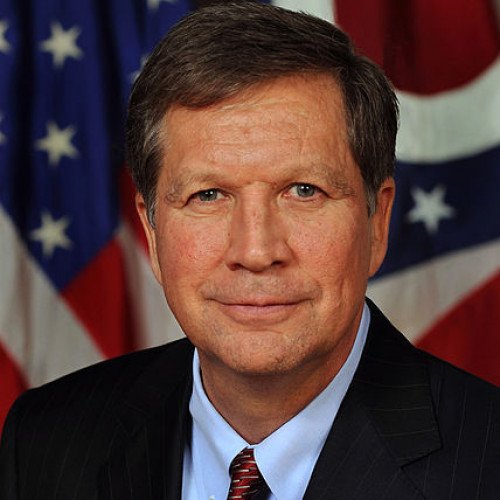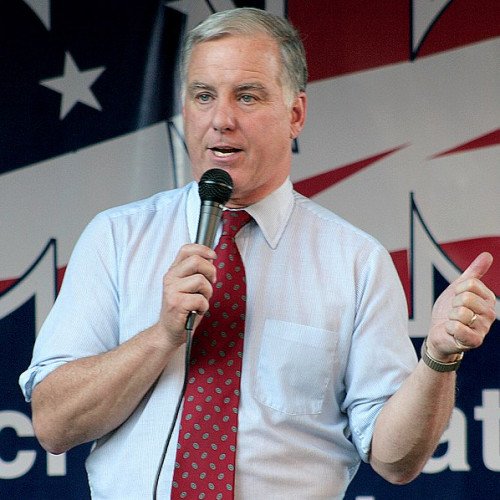John Kasich VS Howard Dean

John Kasich
John Richard Kasich Jr. ( KAY-sik; born May 13, 1952) is an American politician, author, and television news host who served in the U.S. House of Representatives from 1983 to 2001 and as the 69th Governor of Ohio from 2011 to 2019. A Republican, Kasich unsuccessfully sought his party's presidential nomination in 2000 and 2016.Kasich grew up in McKees Rocks, Pennsylvania, moving to Ohio to attend college. After a single term in the Ohio Senate, he served nine terms as a member of the United States House of Representatives from Ohio's 12th congressional district. His tenure in the House included 18 years on the House Armed Services Committee and six years as chairman of the House Budget Committee. Kasich was a key figure in the passage of both 1996 welfare reform legislation and the Balanced Budget Act of 1997. Kasich decided not to run for re-election in 2000 and ran for president instead. He withdrew from the race before the Republican primaries. After leaving Congress, Kasich hosted Heartland with John Kasich on Fox News from 2001 to 2007 and served as managing director of the Lehman Brothers office in Columbus, Ohio. He ran for governor of Ohio in 2010, defeating Democratic incumbent Ted Strickland. He was re-elected in 2014, defeating Democratic challenger Ed FitzGerald by 30 percentage points. Kasich was term-limited and could not seek a third gubernatorial term in 2018; he was succeeded by Mike DeWine. Kasich ran for president again in 2016, finishing in third place in the Republican primaries behind Donald Trump and Ted Cruz. He won the primary in his home state of Ohio and finished second in New Hampshire. Kasich declined to support Trump as the Republican presidential nominee and did not attend the 2016 Republican National Convention, which was held in Ohio. In 2019, following the end of his second term as governor, Kasich joined CNN as a contributor. Kasich is known as one of the most prominent critics of Trump within the Republican Party, and he endorsed Democratic presidential nominee Joe Biden for president in a speech at the 2020 Democratic National Convention.
Statistics for this Xoptio

Howard Dean
Howard Brush Dean III (born November 17, 1948) is an American physician, author, and retired politician who served as Governor of Vermont from 1991 to 2003 and Chair of the Democratic National Committee (DNC) from 2005 to 2009. Dean was a candidate for the Democratic nomination in the 2004 presidential election. His implementation of the fifty-state strategy as head of the DNC is credited with the Democratic victories in the 2006 and 2008 elections. Afterward, he became a political commentator and consultant to McKenna Long & Aldridge, a law and lobbying firm. Before entering politics, Dean earned his medical degree from the Albert Einstein College of Medicine in 1978. Dean served as a member of the Vermont House of Representatives from 1983 to 1986 and as Lieutenant Governor of Vermont from 1987 to 1991. Both were part-time positions that enabled him to continue practicing medicine. In 1991, Dean became governor of Vermont when Richard A. Snelling died in office. Dean was subsequently elected to five two-year terms, serving from 1991 to 2003, making him the second longest-serving governor in Vermont history, after Thomas Chittenden (1778–1789 and 1790–1797). Dean served as chairman of the National Governors Association from 1994 to 1995; during his term, Vermont paid off much of its public debt and had a balanced budget 11 times, lowering income taxes twice. Dean also oversaw the expansion of the "Dr. Dynasaur" program, which ensures universal health care for children and pregnant women in the state. He is a noted staunch supporter of universal health care.Dean denounced the 2003 invasion of Iraq and called on Democrats to oppose the Bush administration. In the 2004 election, Dean was the top fundraiser and front runner, prior to the Iowa caucus, for the Democratic Party presidential nomination. Although he lost the nomination to Senator John Kerry of Massachusetts, Dean pioneered Internet-based fundraising and grassroots organizing, which is centered on mass appeal to small donors which is more cost efficient than the more expensive contacting of fewer potential larger donors, and promotes active participatory democracy among the general public. In 2004, Dean founded Democracy for America, a progressive political action committee. He was later elected chairman of the Democratic National Committee in February 2005. As chairman of the party, Dean created and employed the 50 State Strategy that attempted to make Democrats competitive in normally conservative states often dismissed in the past as "solid red". The success of the strategy became apparent after the 2006 midterm elections, where Democrats took back the House and picked up seats in the Senate from normally Republican states such as Missouri and Montana. In the 2008 presidential election, Barack Obama used the 50 state strategy as the backbone of his candidacy. Dean was named chairman emeritus of the DNC upon his retirement. Since retiring from the DNC chairman position, Dean has held neither elected office nor an official position in the Democratic Party and, as of 2015, was working for global law firm Dentons as part of the firm's public policy and regulation practice. In 2013, Dean expressed interest in running for the presidency in 2016, but instead supported former Secretary of State Hillary Clinton's run for president. Dean endorsed Clinton over her competitor Senator Bernie Sanders in spite of the fact that Sanders represented the state of Vermont, where Dean had been governor.